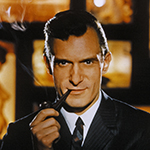 |
Hugh Hefner, founder of Playboy magazine, which he expanded into an empire that encompassed television, digital communications and music, died Sept. 27. He was 91.
Launched in 1953, Playboy grew into the largest men’s magazine in the world, selling more than 7M copies per month in 1971,
By 2015, the year that Playboy broke from its legacy by deciding not to publish photos of fully nude women, the magazine’s circulation was just 800,000, ranking it No. 2 in the second best-selling title in the men’s magazines category, behind Maxim.
While best-known for images of scantily clad women, Playboy also included writing from a who’s who of literature: Jack Kerouac, John Updike, Kurt Vonnegut, Joseph Heller, Gabriel Garcia Marquez and Margaret Atwood, among many others.
In addition, the “Playboy Interview,” which made its debut when Alex Haley interviewed Miles Davis for the magazine in 1962, featured a wide range of political and cultural figures, from Malcolm X and Martin Luther King, Jr., to Tina Fey and Steve Jobs.
Hefner also brought the Playboy brand to television. He hosted two programs, “Playboy’s Penthouse,” which ran from 1959-61, and “Playboy After Dark,” which aired from 1969-70. Both shows took the form of parties at Hef’s house and served to publicize the lifestyle associated with the magazine.
He also was a master at using the brand the magazine established to sell a wide range of products, from t-shirts and baseball caps to a line of wines.
In addition to running Playboy Enterprises, Hefner also campaigned against what he saw as American puritanism. His support of abortion rights, decriminalization of marijuana and the repeal of 19th-century sex laws may have been daring at the time, but as society changed his position entered the cultural mainstream.
“My father lived an exceptional and impactful life as a media and cultural pioneer and a leading voice behind some of the most significant social and cultural movements of our time in advocating free speech, civil rights and sexual freedom," said Cooper Hefner, Playboy’s chief creative executive. “He defined a lifestyle and ethos that lie at the heart of the Playboy brand, one of the most recognizable and enduring in history.”


 Trump Media & Technology Group today reported a $58.2M net loss on $4.1M in 2023 revenues, a disclosure that drove its stock price down 22.6 percent to $47.96.
Trump Media & Technology Group today reported a $58.2M net loss on $4.1M in 2023 revenues, a disclosure that drove its stock price down 22.6 percent to $47.96. Barry Pollack, an attorney at Wall Street’s Harris St. Laurent & Wechsler, has registered Julian Assange as a client with the Justice Dept. “out of an abundance of caution.”
Barry Pollack, an attorney at Wall Street’s Harris St. Laurent & Wechsler, has registered Julian Assange as a client with the Justice Dept. “out of an abundance of caution.” Paramount Global to slash 800 jobs in what chief executive Bob Bakish calls part of an effort to “return the company to earnings growth"... Rolling Stone editor-in-chief Noah Shachtman is exiting at the end of the month due to disagreements with chief executive Gus Wenner over the direction the magazine is taking... The New York Times broke the $1 billion barrier in annual revenue from digital subscriptions in 2023... Press Forward is investing more than $500 million to strengthen local newsrooms.
Paramount Global to slash 800 jobs in what chief executive Bob Bakish calls part of an effort to “return the company to earnings growth"... Rolling Stone editor-in-chief Noah Shachtman is exiting at the end of the month due to disagreements with chief executive Gus Wenner over the direction the magazine is taking... The New York Times broke the $1 billion barrier in annual revenue from digital subscriptions in 2023... Press Forward is investing more than $500 million to strengthen local newsrooms. The majority of news articles are read within the first three days of publication, according to a recent report.
The majority of news articles are read within the first three days of publication, according to a recent report. The Los Angeles Times gives pink slips to 115 people or 20 percent of its newsroom staff... TIME is also laying off about 30 employees, which is approximately 15 percent of its editorial staff... The Baltimore Banner, which was launched by Stewart Bainum in 2022 after he failed to buy the Baltimore Sun, added 500 subscribers per day in the three days following Sinclair Broadcast Group's deal to purchase the Sun.
The Los Angeles Times gives pink slips to 115 people or 20 percent of its newsroom staff... TIME is also laying off about 30 employees, which is approximately 15 percent of its editorial staff... The Baltimore Banner, which was launched by Stewart Bainum in 2022 after he failed to buy the Baltimore Sun, added 500 subscribers per day in the three days following Sinclair Broadcast Group's deal to purchase the Sun.


 Have a comment? Send it to
Have a comment? Send it to 
No comments have been submitted for this story yet.